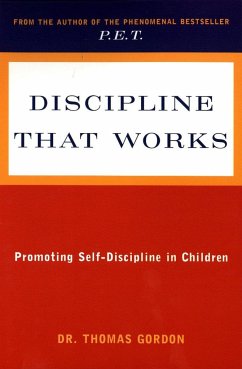22,99 €
inkl. MwSt.
Versandfertig in 1-2 Wochen

11 °P sammeln
- Broschiertes Buch
- Merkliste
- Auf die Merkliste
- Bewerten Bewerten
- Teilen
- Produkt teilen
- Produkterinnerung
- Produkterinnerung
Dr. Thomas Gordon, author of the phenomenal bestseller P.E.T., expands the system he developed to help parents to encompass teachers and childcare workers. In Discipline That Works, Dr. Gordon provides convincing evidence that punitive discipline is harmful to children and promotes self-destructive behavior and anti-social, aggressive acts. Instead, he offers an important new strategy to help children become more self-reliant, make positive decisions, and control their own behavior.
Andere Kunden interessierten sich auch für
![A Heart That Works A Heart That Works]() Rob DelaneyA Heart That Works22,99 €
Rob DelaneyA Heart That Works22,99 €![Boost Your Self Understanding - 250 Tips and Ways That Works Boost Your Self Understanding - 250 Tips and Ways That Works]() Danny NandyBoost Your Self Understanding - 250 Tips and Ways That Works15,99 €
Danny NandyBoost Your Self Understanding - 250 Tips and Ways That Works15,99 €![Love That Works Love That Works]() James R. FleckensteinLove That Works12,99 €
James R. FleckensteinLove That Works12,99 €![Marriage That Works Is Work Marriage That Works Is Work]() James Rudy GrayMarriage That Works Is Work15,99 €
James Rudy GrayMarriage That Works Is Work15,99 €![Work That Works Work That Wins Work That Works Work That Wins]() Marcio MoreiraWork That Works Work That Wins27,99 €
Marcio MoreiraWork That Works Work That Wins27,99 €![The Collected Works of Florence Scovel Shinn (The Game of Life and How to Play It, Your Word Is Your Wand, The Secret Door to Success, and The Power of the Spoken Word) The Collected Works of Florence Scovel Shinn (The Game of Life and How to Play It, Your Word Is Your Wand, The Secret Door to Success, and The Power of the Spoken Word)]() Florence Scovel ShinnThe Collected Works of Florence Scovel Shinn (The Game of Life and How to Play It, Your Word Is Your Wand, The Secret Door to Success, and The Power of the Spoken Word)13,99 €
Florence Scovel ShinnThe Collected Works of Florence Scovel Shinn (The Game of Life and How to Play It, Your Word Is Your Wand, The Secret Door to Success, and The Power of the Spoken Word)13,99 €![This Works This Works]() Robert A RussellThis Works20,99 €
Robert A RussellThis Works20,99 €-
-
-
Dr. Thomas Gordon, author of the phenomenal bestseller P.E.T., expands the system he developed to help parents to encompass teachers and childcare workers. In Discipline That Works, Dr. Gordon provides convincing evidence that punitive discipline is harmful to children and promotes self-destructive behavior and anti-social, aggressive acts. Instead, he offers an important new strategy to help children become more self-reliant, make positive decisions, and control their own behavior.
Hinweis: Dieser Artikel kann nur an eine deutsche Lieferadresse ausgeliefert werden.
Hinweis: Dieser Artikel kann nur an eine deutsche Lieferadresse ausgeliefert werden.
Produktdetails
- Produktdetails
- Verlag: Penguin Publishing Group
- Seitenzahl: 290
- Erscheinungstermin: 1. August 1991
- Englisch
- Abmessung: 203mm x 135mm x 17mm
- Gewicht: 374g
- ISBN-13: 9780452266438
- ISBN-10: 0452266432
- Artikelnr.: 35663062
- Herstellerkennzeichnung
- Libri GmbH
- Europaallee 1
- 36244 Bad Hersfeld
- gpsr@libri.de
- Verlag: Penguin Publishing Group
- Seitenzahl: 290
- Erscheinungstermin: 1. August 1991
- Englisch
- Abmessung: 203mm x 135mm x 17mm
- Gewicht: 374g
- ISBN-13: 9780452266438
- ISBN-10: 0452266432
- Artikelnr.: 35663062
- Herstellerkennzeichnung
- Libri GmbH
- Europaallee 1
- 36244 Bad Hersfeld
- gpsr@libri.de
Thomas Gordon
Introduction: The Discipline Debate
Part I. Understanding DisciplineChapter 1: Defining Terms and Clarifying
Meanings
The Noun and the Verb
Teaching Versus Controlling
Other-Imposed Discipline Versus Self-Discipline
A Disagreement About Limits
Should I Be Strict or Lenient?
The Multiple Meanings of "Authority"
The Myth of "Benevolent Authority"
Chapter 2: The Traditional Reward-and-Punish Approach
Where Do Controllers Get Their Power?
How Rewards Are Supposed to Work
How Punishment Is Supposed to Work
The Conditions for Controlling with Rewards and Punishments
External Versus Internal Control
Chapter 3: Why We Can't Count on Rewards Working
The Technology of Controlling with Rewards
Difficulties Parents and Teachers Encounter with Rewards
A Deeper Analysis of Praise
Effective Alternatives to Praise
Chapter 4: The Deficiencies and Dangers of Punishment
It Takes Expertise to Make Punishment Work
"Punishment Is Acceptable if It's Mild"
The Risks of Making Punishment Severe
When the Cat's Away...
How Punishment Fosters Aggresion and Violence
Adults Inevitably Run Out of Punishments
To the Controller, Power Comes at a Price
Chapter 5: How Children Really React to Control
The Coping Mechanisms Children Use
Retaliatory Violence Against Controllers
When Youngsters "Divorce" Their Parents
Sowing the Seeds of Criminal Behavior
The Failure of Juvenile Courts
Warning: Discipline Is Hazardous to Children's Health and Well-Being
Getting High and Tuning Out
The Controller's Loss of Influence
Do We Want Obedient Youngsters?
Part II. Alternatives to Disciplining ChildrenChapter 6: Noncontrolling
Methods to Get Children to Change Behavior
Children Don't Really Misbehave
Who "Owns" The Problem?
Alternative #1: Find Out What the Child Needs
Alternative #2: Let's Make a Trade
Alternative #3: Modify the Environment
Alternative #4: The Confrontive I-Message
Alternative #5: The Preventative I-Message
Alternative #6: Shifting Gears to Reduce Resistance
Alternative #7: Problem Solving
Alternative #8: When Angry, Find the "Primary Feeling"
How I-Messages Change the Sender
Chapter 7: New Ways of Governing Families and Classrooms
Participative Management
Groups Need Rules
The Six-Step Problem-Solving Process
Conflict-Resolution: The No-Lose Method
Dealing with Values Collisions
Chapter 8: Helping Children Solve Problems Themselves
Helping Children Use the Problem-Solving Process
The Language of Unacceptance
Acceptance: The Basic Helping Attitude
How to Demonstrate Your Acceptance
Chapter 9: Active Listening: The All-Purpose People Skill
Mediating Child-Child Conflicts
Insuring Good Group Discussion
Toward Warner Relationships Between Teacher and Students
Research Supporting Facilitative Skills Training
Other Benefits from Learning the Facilitative Skills
Chapter 10: Why Adults Don't Give Up Disciplining Children
The Doctrine of "Spoiling" Children
The Belief That Children Are Bad by Nature
Either-Or Thinking about Adult-Child Conflicts
The Biblical Defense of Punitive Discipline
The Permissiveness Myth
Attitudes Against Democratic Leadership
Resistance to Training
Fear of Change in the American Family
Resistance to Change in Schools
Chapter 11. How Democratic Relationships Foster Health and Well-Being
References
Index
Part I. Understanding DisciplineChapter 1: Defining Terms and Clarifying
Meanings
The Noun and the Verb
Teaching Versus Controlling
Other-Imposed Discipline Versus Self-Discipline
A Disagreement About Limits
Should I Be Strict or Lenient?
The Multiple Meanings of "Authority"
The Myth of "Benevolent Authority"
Chapter 2: The Traditional Reward-and-Punish Approach
Where Do Controllers Get Their Power?
How Rewards Are Supposed to Work
How Punishment Is Supposed to Work
The Conditions for Controlling with Rewards and Punishments
External Versus Internal Control
Chapter 3: Why We Can't Count on Rewards Working
The Technology of Controlling with Rewards
Difficulties Parents and Teachers Encounter with Rewards
A Deeper Analysis of Praise
Effective Alternatives to Praise
Chapter 4: The Deficiencies and Dangers of Punishment
It Takes Expertise to Make Punishment Work
"Punishment Is Acceptable if It's Mild"
The Risks of Making Punishment Severe
When the Cat's Away...
How Punishment Fosters Aggresion and Violence
Adults Inevitably Run Out of Punishments
To the Controller, Power Comes at a Price
Chapter 5: How Children Really React to Control
The Coping Mechanisms Children Use
Retaliatory Violence Against Controllers
When Youngsters "Divorce" Their Parents
Sowing the Seeds of Criminal Behavior
The Failure of Juvenile Courts
Warning: Discipline Is Hazardous to Children's Health and Well-Being
Getting High and Tuning Out
The Controller's Loss of Influence
Do We Want Obedient Youngsters?
Part II. Alternatives to Disciplining ChildrenChapter 6: Noncontrolling
Methods to Get Children to Change Behavior
Children Don't Really Misbehave
Who "Owns" The Problem?
Alternative #1: Find Out What the Child Needs
Alternative #2: Let's Make a Trade
Alternative #3: Modify the Environment
Alternative #4: The Confrontive I-Message
Alternative #5: The Preventative I-Message
Alternative #6: Shifting Gears to Reduce Resistance
Alternative #7: Problem Solving
Alternative #8: When Angry, Find the "Primary Feeling"
How I-Messages Change the Sender
Chapter 7: New Ways of Governing Families and Classrooms
Participative Management
Groups Need Rules
The Six-Step Problem-Solving Process
Conflict-Resolution: The No-Lose Method
Dealing with Values Collisions
Chapter 8: Helping Children Solve Problems Themselves
Helping Children Use the Problem-Solving Process
The Language of Unacceptance
Acceptance: The Basic Helping Attitude
How to Demonstrate Your Acceptance
Chapter 9: Active Listening: The All-Purpose People Skill
Mediating Child-Child Conflicts
Insuring Good Group Discussion
Toward Warner Relationships Between Teacher and Students
Research Supporting Facilitative Skills Training
Other Benefits from Learning the Facilitative Skills
Chapter 10: Why Adults Don't Give Up Disciplining Children
The Doctrine of "Spoiling" Children
The Belief That Children Are Bad by Nature
Either-Or Thinking about Adult-Child Conflicts
The Biblical Defense of Punitive Discipline
The Permissiveness Myth
Attitudes Against Democratic Leadership
Resistance to Training
Fear of Change in the American Family
Resistance to Change in Schools
Chapter 11. How Democratic Relationships Foster Health and Well-Being
References
Index
Introduction: The Discipline Debate
Part I. Understanding DisciplineChapter 1: Defining Terms and Clarifying
Meanings
The Noun and the Verb
Teaching Versus Controlling
Other-Imposed Discipline Versus Self-Discipline
A Disagreement About Limits
Should I Be Strict or Lenient?
The Multiple Meanings of "Authority"
The Myth of "Benevolent Authority"
Chapter 2: The Traditional Reward-and-Punish Approach
Where Do Controllers Get Their Power?
How Rewards Are Supposed to Work
How Punishment Is Supposed to Work
The Conditions for Controlling with Rewards and Punishments
External Versus Internal Control
Chapter 3: Why We Can't Count on Rewards Working
The Technology of Controlling with Rewards
Difficulties Parents and Teachers Encounter with Rewards
A Deeper Analysis of Praise
Effective Alternatives to Praise
Chapter 4: The Deficiencies and Dangers of Punishment
It Takes Expertise to Make Punishment Work
"Punishment Is Acceptable if It's Mild"
The Risks of Making Punishment Severe
When the Cat's Away...
How Punishment Fosters Aggresion and Violence
Adults Inevitably Run Out of Punishments
To the Controller, Power Comes at a Price
Chapter 5: How Children Really React to Control
The Coping Mechanisms Children Use
Retaliatory Violence Against Controllers
When Youngsters "Divorce" Their Parents
Sowing the Seeds of Criminal Behavior
The Failure of Juvenile Courts
Warning: Discipline Is Hazardous to Children's Health and Well-Being
Getting High and Tuning Out
The Controller's Loss of Influence
Do We Want Obedient Youngsters?
Part II. Alternatives to Disciplining ChildrenChapter 6: Noncontrolling
Methods to Get Children to Change Behavior
Children Don't Really Misbehave
Who "Owns" The Problem?
Alternative #1: Find Out What the Child Needs
Alternative #2: Let's Make a Trade
Alternative #3: Modify the Environment
Alternative #4: The Confrontive I-Message
Alternative #5: The Preventative I-Message
Alternative #6: Shifting Gears to Reduce Resistance
Alternative #7: Problem Solving
Alternative #8: When Angry, Find the "Primary Feeling"
How I-Messages Change the Sender
Chapter 7: New Ways of Governing Families and Classrooms
Participative Management
Groups Need Rules
The Six-Step Problem-Solving Process
Conflict-Resolution: The No-Lose Method
Dealing with Values Collisions
Chapter 8: Helping Children Solve Problems Themselves
Helping Children Use the Problem-Solving Process
The Language of Unacceptance
Acceptance: The Basic Helping Attitude
How to Demonstrate Your Acceptance
Chapter 9: Active Listening: The All-Purpose People Skill
Mediating Child-Child Conflicts
Insuring Good Group Discussion
Toward Warner Relationships Between Teacher and Students
Research Supporting Facilitative Skills Training
Other Benefits from Learning the Facilitative Skills
Chapter 10: Why Adults Don't Give Up Disciplining Children
The Doctrine of "Spoiling" Children
The Belief That Children Are Bad by Nature
Either-Or Thinking about Adult-Child Conflicts
The Biblical Defense of Punitive Discipline
The Permissiveness Myth
Attitudes Against Democratic Leadership
Resistance to Training
Fear of Change in the American Family
Resistance to Change in Schools
Chapter 11. How Democratic Relationships Foster Health and Well-Being
References
Index
Part I. Understanding DisciplineChapter 1: Defining Terms and Clarifying
Meanings
The Noun and the Verb
Teaching Versus Controlling
Other-Imposed Discipline Versus Self-Discipline
A Disagreement About Limits
Should I Be Strict or Lenient?
The Multiple Meanings of "Authority"
The Myth of "Benevolent Authority"
Chapter 2: The Traditional Reward-and-Punish Approach
Where Do Controllers Get Their Power?
How Rewards Are Supposed to Work
How Punishment Is Supposed to Work
The Conditions for Controlling with Rewards and Punishments
External Versus Internal Control
Chapter 3: Why We Can't Count on Rewards Working
The Technology of Controlling with Rewards
Difficulties Parents and Teachers Encounter with Rewards
A Deeper Analysis of Praise
Effective Alternatives to Praise
Chapter 4: The Deficiencies and Dangers of Punishment
It Takes Expertise to Make Punishment Work
"Punishment Is Acceptable if It's Mild"
The Risks of Making Punishment Severe
When the Cat's Away...
How Punishment Fosters Aggresion and Violence
Adults Inevitably Run Out of Punishments
To the Controller, Power Comes at a Price
Chapter 5: How Children Really React to Control
The Coping Mechanisms Children Use
Retaliatory Violence Against Controllers
When Youngsters "Divorce" Their Parents
Sowing the Seeds of Criminal Behavior
The Failure of Juvenile Courts
Warning: Discipline Is Hazardous to Children's Health and Well-Being
Getting High and Tuning Out
The Controller's Loss of Influence
Do We Want Obedient Youngsters?
Part II. Alternatives to Disciplining ChildrenChapter 6: Noncontrolling
Methods to Get Children to Change Behavior
Children Don't Really Misbehave
Who "Owns" The Problem?
Alternative #1: Find Out What the Child Needs
Alternative #2: Let's Make a Trade
Alternative #3: Modify the Environment
Alternative #4: The Confrontive I-Message
Alternative #5: The Preventative I-Message
Alternative #6: Shifting Gears to Reduce Resistance
Alternative #7: Problem Solving
Alternative #8: When Angry, Find the "Primary Feeling"
How I-Messages Change the Sender
Chapter 7: New Ways of Governing Families and Classrooms
Participative Management
Groups Need Rules
The Six-Step Problem-Solving Process
Conflict-Resolution: The No-Lose Method
Dealing with Values Collisions
Chapter 8: Helping Children Solve Problems Themselves
Helping Children Use the Problem-Solving Process
The Language of Unacceptance
Acceptance: The Basic Helping Attitude
How to Demonstrate Your Acceptance
Chapter 9: Active Listening: The All-Purpose People Skill
Mediating Child-Child Conflicts
Insuring Good Group Discussion
Toward Warner Relationships Between Teacher and Students
Research Supporting Facilitative Skills Training
Other Benefits from Learning the Facilitative Skills
Chapter 10: Why Adults Don't Give Up Disciplining Children
The Doctrine of "Spoiling" Children
The Belief That Children Are Bad by Nature
Either-Or Thinking about Adult-Child Conflicts
The Biblical Defense of Punitive Discipline
The Permissiveness Myth
Attitudes Against Democratic Leadership
Resistance to Training
Fear of Change in the American Family
Resistance to Change in Schools
Chapter 11. How Democratic Relationships Foster Health and Well-Being
References
Index







